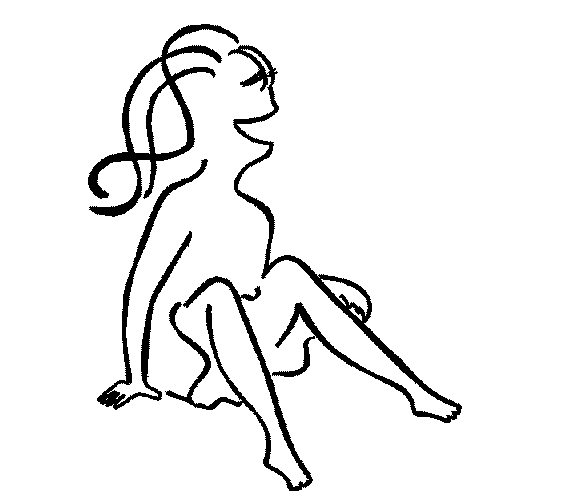

Every artist needs to know when to stop. You can't keep painting on the same canvas forever, or re-arranging the notes in the same song, or making endless takes of the same scene in a movie. You need to know when some thing is good enough to be finished, and then let it go.
But what if a piece simply isn't good enough? How do you know when to STOP working on it? How can you recognize when something you've put a lot of time to may never be any good at all?
It's a dilemna I'm facing with both Charlotte's Mirror and the cartoon above, a version of Merrilyn in In a Lonely Place. 
Charlotte's Mirror is more than three years old, and I'm still not happy with it. Meanwhile, I've been working on the Merrilyn cartoon for nearly a year now - you can see some of the versions throughout this September news update - yet it never seems quite right. My poor sister, Sara, has sat modelling in uncomfortable positions in front of MTV for hours while I try to get Merrilyn's head position right.
I suppose it's good to have occasional failures, because if you didn't it would mean you had never tried anything different, that you were writing the same story over and over, and drawing the same cartoon.
Still, it's hard to know whether or not one of these "difficult" efforts will eventually turn out to be one of your best pieces, or just always be crap.
This site was featured in the August 11 version of the New York Times, a sure formula for impressing the glitterati and pissing off my ex-boyfriends.
To be honest, I've always loathed the Times, although the man who interviewed me was very nice. His newspaper may be smug and self-adoring and completely out of touch, but he was very friendly and took me out for Turkish food after the interview.
Was it selling out to talk to the Times? Probably, but brought readers to the stories, which is the only reason the site is here in the first place.
Other public appearances this month: Tokyo's Daily Yomiyuri, and as the "Work in Progress" on AOL's new "Book Report" section, which set up a nifty graphic comparing the way I actually look to one of my cartoons. Scheduled for September are appearances in People Magazine and Yahoo's Internet Life magazine.

I also received a nice e-mail from Robert Olen Butler, who won the 1993 Putlitzer Prize for Fiction. You can view his comments in Reader's Speak.
I'm not a big fan of literary awards. Good fiction, to me, is an incredibly intimate experience - it's not an egg and spoon race. There's not always a clear best or second-best.
Bob Butler, however, explained to me that he was a struggling writer until he got that stupid award - the Pulitzer is just a certificate, you don't even get a statuette - that after that award, he had hundreds of thousands of readers.
So who the hell knows. I'd like to say now, that I'd never accept an award even if it were offered to me. But if if brings readers to the stories...I don't know. I still think they're a stupid idea.
At least six blocks of that distance appears to be made up of first novels, the ink still fragrant on their pages, their trendy covers uncrumpled, their black and white author photos brooding off into the distance. Most copies have never been opened, and they never will be.
Their authors thought they'd made it when they got a book deal. Most likely, they earned an advance of $10,000 or less, money they will never make back and never see more of. Who buys a $25 hardcover by an unknown author? Not me, and not anybody I know. Most contemporary fiction is terrible, the same old themes and the same old styles endorsed by the creative writing school mafia.

Being published in book form shouldn't be the end goal for fiction writers any more, and it certainly isn't for me. I have just about everything I need on the web - readers, feedback, fame, fun. I don't make money, but there are probably fewer fiction writers living totally on their stories than there are players in the NBA. If I can have people's attention, if I can have their eyes, minds and hearts, I really don't need their dosh. I'm happy to work elsewhere to support both this page and the forward march of the electronic word.
Book publishing, and print publishing, is to electronic media what theater was to movies a hundred years ago. At the turn of the century, respectable theater actors were ashamed to work in the "flickers." It was a sign of financial desperation. Eventually, and with the substantial assistance of D.W. Griffiths, movies developed their own style and became the prominent popular art form.
Right now, print writers look down on electronic writers. They consider us hacks. Well, screw them. They'll be sorry. There are little D.W. Griffiths all over the Internet, and in my own small way, I'd like to be one of them.